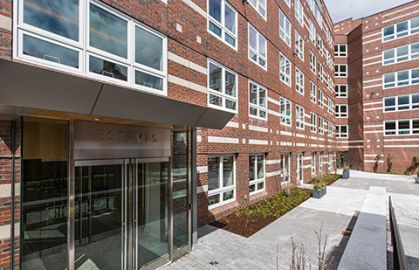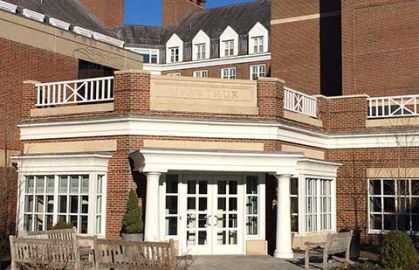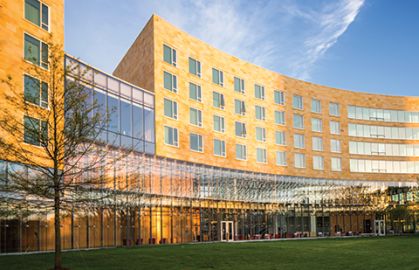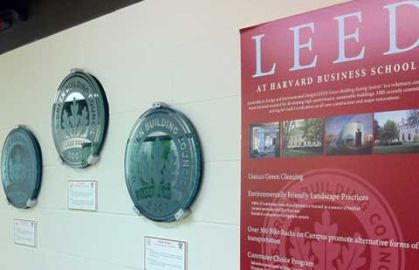Campus Sustainability
Telephone: +1.617.495.8888
(5.8888 or the one-touch Guest Services button from any residence hall phone)
SUN–FRI: 7:00 AM–8:00 PM
SAT: 7:00 AM–5:00 PM
Telephone: +1.617.495.8888
(5.8888 or the one-touch Guest Services button from any residence hall phone)
SUN–FRI: 7:00 AM–8:00 PM
SAT: 7:00 AM–5:00 PM
What is HBS Doing?
Harvard Business School (HBS) is committed to Harvard's Sustainability and Climate Action Plan, which includes achieving a fossil fuel-free future.
HBS Sustainability strives to build a healthier, more sustainable and inclusive community. We are committed to internalizing justice and equity in our sustainability work. Learn how we're addressing the challenges and opportunities of sustainability leadership through campus operations and community engagement.
Learn how the HBS Business and Environment Initiative (BEI) works across all departments of the School, and connects with students, alumni, and faculty to shape curriculum and research agendas, to educate, connect, and mobilize business leaders to address climate change and other environmental challenges.
-
What is HBS Doing?
-
Harvard Business School (HBS) is committed to Harvard's Sustainability and Climate Action Plan, which includes achieving a fossil fuel-free future.
HBS Sustainability strives to build a healthier, more sustainable and inclusive community. We are committed to internalizing justice and equity in our sustainability work. Learn how we're addressing the challenges and opportunities of sustainability leadership through campus operations and community engagement.
Learn how the HBS Business and Environment Initiative (BEI) works across all departments of the School, and connects with students, alumni, and faculty to shape curriculum and research agendas, to educate, connect, and mobilize business leaders to address climate change and other environmental challenges.
What You Can DoExpand AllCollapse All
Energy:Energy:
- Turn off lights including bedroom, bathroom, lounge, and project/conference rooms upon leaving.
- Use natural daylight (ideal for your circadian rhythm) or task lighting, which is more efficient than overhead lighting.
- Turn off computer monitor and speakers when not in use.
- Unplug chargers and adapters when not in use.
Water:Water:
- Most participants typically use their bathroom towels more than once. Please consider participating in our towel reuse program to save water and energy during your stay.
- Drink filtered tap water instead of bottle water. The tap water is safe to drink and filtered water stations are available throughout campus.
Waste:Waste:
- HBS has a number of waste reduction initiatives including back and front of house composting, single-stream recycling, electronic waste recycling, and food donations.
- Recycle all plastics, glass, metal cans, paper, and cardboard in the same single-stream recycling bin. Give batteries, and other electronic waste, to your program staff to be properly recycled.
- Use reusable dishware whenever possible versus disposable items.
- Leave unwanted items on your desk. During your stay you will receive a variety of materials that you may take with you upon departure. If you would rather leave some things on your desk, we are happy to recycle them on your behalf.
Health & Well-being:Health & Well-being:
- HBS is a leader in health and the built environment at Harvard. Learn more about how healthier buildings make healthier people and what you can do to reduce your exposure to harmful chemicals.
- Consider the many plant-forward dining options during your stay to reduce your individual emissions footprint.
- Visit the Shad Fitness Center for classes and resources related to health and wellness.
Energy:
- Turn off lights including bedroom, bathroom, lounge, and project/conference rooms upon leaving.
- Use natural daylight (ideal for your circadian rhythm) or task lighting, which is more efficient than overhead lighting.
- Turn off computer monitor and speakers when not in use.
- Unplug chargers and adapters when not in use.
Water:
- Most participants typically use their bathroom towels more than once. Please consider participating in our towel reuse program to save water and energy during your stay.
- Drink filtered tap water instead of bottle water. The tap water is safe to drink and filtered water stations are available throughout campus.
Waste:
- HBS has a number of waste reduction initiatives including back and front of house composting, single-stream recycling, electronic waste recycling, and food donations.
- Recycle all plastics, glass, metal cans, paper, and cardboard in the same single-stream recycling bin. Give batteries, and other electronic waste, to your program staff to be properly recycled.
- Use reusable dishware whenever possible versus disposable items.
- Leave unwanted items on your desk. During your stay you will receive a variety of materials that you may take with you upon departure. If you would rather leave some things on your desk, we are happy to recycle them on your behalf.
Health & Well-being:
- HBS is a leader in health and the built environment at Harvard. Learn more about how healthier buildings make healthier people and what you can do to reduce your exposure to harmful chemicals.
- Consider the many plant-forward dining options during your stay to reduce your individual emissions footprint.
- Visit the Shad Fitness Center for classes and resources related to health and wellness.
See Something—Say Something
If you notice a water leak or have a heating/cooling concern, call Guest Services at +1.617.495.8888 (5.8888 or the one-touch Guest Services button from any residence hall phone) Sunday–Friday from 7:00 AM–8:00 PM and Saturday from 7:00 AM–5:00 PM. Outside of these hours, call Maintenance at +1.617.495.6811 (5.6811 or the one-touch Maintenance button from any residence hall phone).
Follow us online to learn more about sustainability efforts at HBS (@green.HBS) and Harvard (@greenharvard). If you have questions or want more information, email sustainability@hbs.edu.
-
See Something—Say Something
-
If you notice a water leak or have a heating/cooling concern, call Guest Services at +1.617.495.8888 (5.8888 or the one-touch Guest Services button from any residence hall phone) Sunday–Friday from 7:00 AM–8:00 PM and Saturday from 7:00 AM–5:00 PM. Outside of these hours, call Maintenance at +1.617.495.6811 (5.6811 or the one-touch Maintenance button from any residence hall phone).
Follow us online to learn more about sustainability efforts at HBS (@green.HBS) and Harvard (@greenharvard). If you have questions or want more information, email sustainability@hbs.edu.
Telephone: +1.617.495.8888
(5.8888 or the one-touch Guest Services button from any residence hall phone)
SUN–FRI: 7:00 AM–8:00 PM
SAT: 7:00 AM–5:00 PM
Telephone: +1.617.495.8888
(5.8888 or the one-touch Guest Services button from any residence hall phone)
SUN–FRI: 7:00 AM–8:00 PM
SAT: 7:00 AM–5:00 PM




